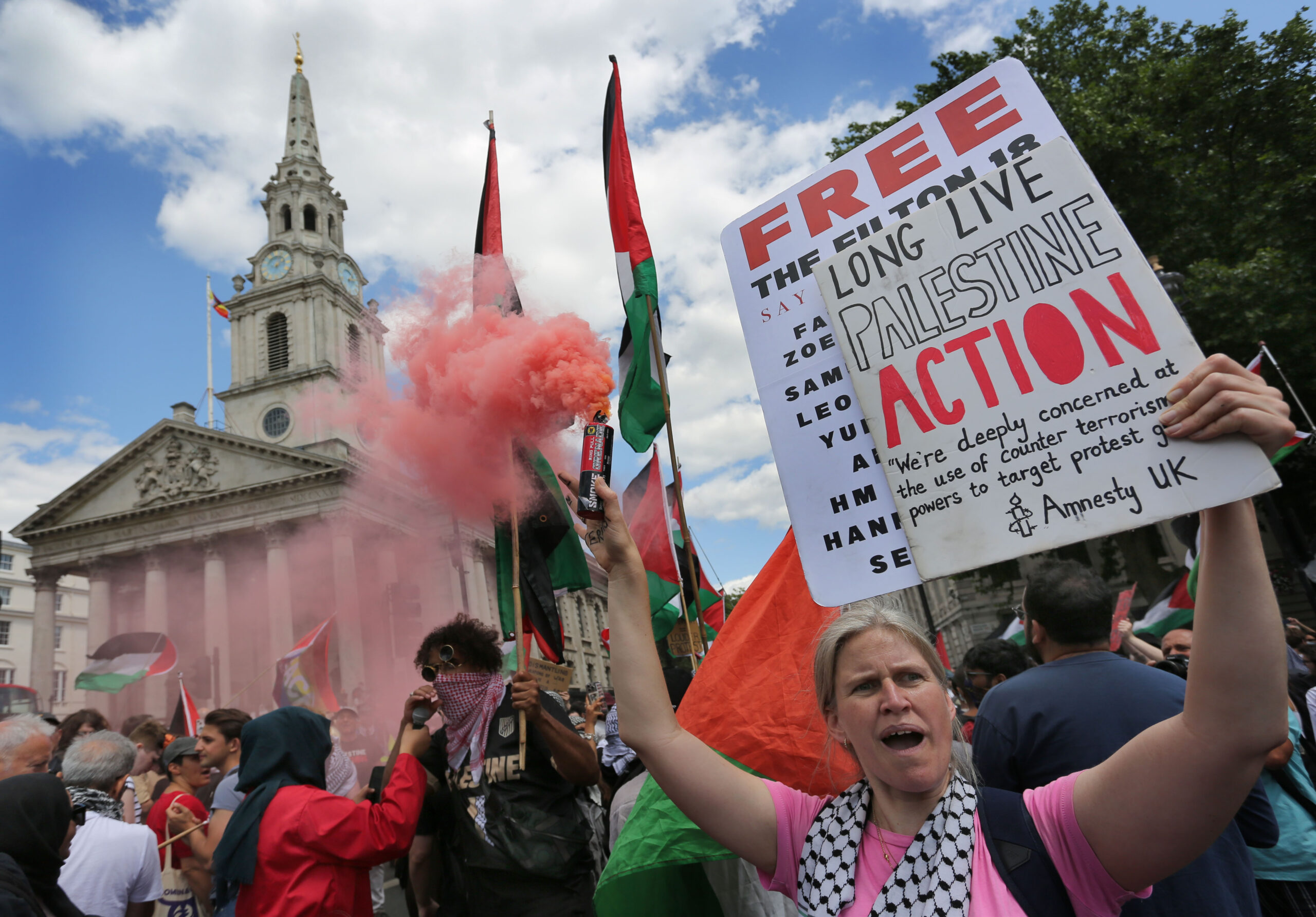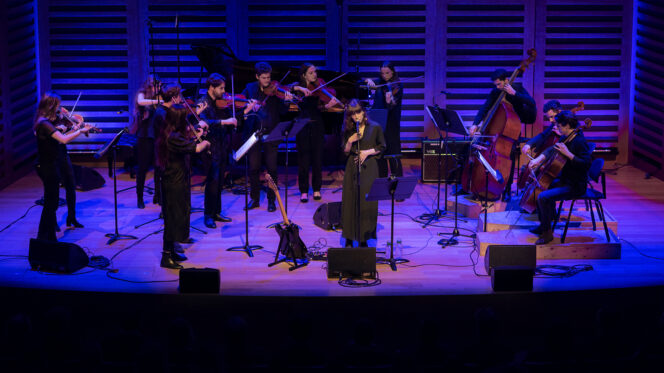Here’s How the Palestine Action Ban Could Affect You
You're a terrorist too, now.
by Simon Childs
24 June 2025

Paywalls? Never. We think quality reporting should be free for everyone – and our supporters make that possible. Chip in today and help build people-powered media that everyone can access.
In March 2000, radical magazine Squall carried an article with a doom-laden warning about the upcoming New Labour terror bill, describing it as “one of the most liberty-corrosive pieces of legislation for decades”. It was “textbook divide and rule stuff” from the Blair government that would “criminalise dissent and marginalise dissenters by threatening their wider support base with unlimited fines and lengthy jail sentences”.
“Taking their lead from the popular press,” the government would “liberally label anyone not overjoyed with creeping global destruction as eco-terrorists,” it warned.
25 years later, home secretary Yvette Cooper’s announcement that peaceful direct action group Palestine Action (PA) will be banned as a terrorist group is a massive escalation in the use of that power. It also represents an expansion of what counts as “terrorism” that will have ramifications for the wider left, including activists and politically engaged people who – until now – have never had to worry about whether they might fall foul of counter-terror law.
Here’s how that could affect leftwing and progressive protesters.
A chilling effect.
Membership of PA will be banned and carry a potential 14-year prison sentence. PA activists won’t be able to simply set up a new group under a different name and carry on with similar activities, like Extinction Rebellion and Just Stop Oil have previously done for tactical reasons. The Home Office is pretty hot on name changes.
Other groups which take up the mantle of PA-style actions will not fall foul of the ban, but PA’s proscription could be used as the justification for counterterror police to get involved with policing direct action protests.
Before their ban, PA activists were already subjected to the attentions of counterterror police. A number of activists are languishing in prison on lengthy remand stretches, on the basis that they’re a threat.
“If nothing else, it justifies increased surveillance. You need to start thinking about how you prepare for that,” Kevin Blowe, from the Network for Police Monitoring (Netpol), told Novara Media.
Despite the pearl-clutching indignation from the government and media, PA’s action at RAF Brize Norton was nothing new. During the Iraq War, Quakers would often infiltrate RAF bases to disrupt their operations. In 2017, two men were acquitted for breaking into a BAE faculty and attempting to disarm jets headed for Yemen. This kind of activity is now likely to draw the attention of counterterror police, which is likely to have a chilling effect.
Support for Palestine Action.
Support for PA will be banned. This includes collecting money, “expressing an opinion or belief that is supportive”, recklessly encouraging support, or organising or addressing a meeting in support of PA – with a meeting meaning as few as three people. These offences could get you up to 14 years in prison.
Wearing clothing or displaying iconography in support of PA could get you up to six months.
For an example of what this might look like in practice, we need to look no further than the case of Kneecap. The Irish rap group’s Mo Chara faces terror charges for picking up a Hezbollah flag thrown from the crowd at a gig at the Kentish Town Forum in November 2024 and waving it.
It wasn’t until April 2025 that videos of this surfaced online, at which point police started investigating. The band said that the incident is “manufactured hysteria” and they have never supported Hezbollah, but Chara faces a hearing on 20 August.
Whatever the context for Chara waving the flag – artistic provocation, absurdist satire, rush of blood to the head, whatever – it goes to show how much care needs to be taken to not fall foul of terror legislation and how people can dig up things you’ve said or done long after the fact.
Most people on the left don’t have the platform of Kneecap. However, it seems reasonable to assume that more people would be likely to express support for PA – a UK-based peaceful protest group – than Hezbollah. We also live in an era where phone cameras are everywhere and there are endless opportunities to publicise your every passing thought on social media. It’s easy to imagine that some activists will continue to express support for PA even if the group is banned and could find themselves in serious trouble for a stray “Free Palestine, support Palestine Action” post on Instagram.
The legislation is also extremely broad. This was seen in the case of Heba Alhayek, 29, and Pauline Ankunda, 26, who were found guilty of terror offences for attaching paraglider images to their backs at a Palestine march seven days after the 7 October attacks in 2023.
Delivering his verdict, judge Tan Ikram said: “I want to be clear, there’s no evidence that any of these defendants are supporters of Hamas, or were seeking to show support for them.” Nonetheless he was duty bound to convict them as a “reasonable person” could have interpreted the images as support for Hamas. He decided not to punish them and gave them a conditional discharge, but now they have criminal records as terrorist offenders. In future, we could be seeing people convicted for wearing something not intended to support Palestine Action, but which a reasonable person could interpret as such, in the eyes of a judge.
All of this only applies to statements of support for the group itself. You could, for example, continue to express support for the principle of taking direct action against the genocide without falling foul of this ban.
It’s also worth pointing out that the ban can’t be applied retrospectively. It can’t be used by the police for things that have already happened, so there’s no need to start combing through your previous social media posts as far as the law is concerned – although mischief makers will now be able to point to your past statements as evidence that you “support terrorism”.
It will also still be possible to campaign for Palestine Action to be de-proscribed. CAGE International’s campaign to have Hamas removed from the government’s proscription list, or similar demands from Kurds about the Kurdistan Workers’ Party (PKK) have not fallen foul of counterterror laws.
It won’t stop at Palestine Action.
A ban on PA could also empower counterterror police to take action against the broader left.
This has already happened to north London’s Kurdish community, for example. On 27 November 2024, hundreds of cops – including riot police in armoured vans – deploying dogs and helicopters swooped on the Kurdish Community Centre (KCC) and imposed a military-like occupation of the surrounding area of Haringey.
The raid was part of a “significant” Metropolitan Police terror investigation into suspected activity linked to the PKK, which is listed as a terror group, even though David Lammy was happy to praise its leaders until he became foreign secretary. The Kurdish community says that the PKK is just one part of a broader social movement and that its proscription criminalises an entire community.
In the case of PA, the potential for guilt by association can be seen by following the statements of those who claim to understand political extremism.
PA’s ban is the wish-fulfillment of Lord Walney, the government’s discredited former extremism advisor. He has previously claimed that the Palestine Solidarity Campaign (PSC) – which organises mass marches and lobbies MPs – has “strong links” to PA. The fact that the two groups have entirely different tactics and that PA was formed by people who were frustrated with the slow progress made by so-called ‘legitimate’ forms of protest didn’t stop him making this absurd claim, while being a supposed expert.
Walney is now tabling an amendment to the crime and policing bill which aims to give the police more powers to stop the activities of environmental groups such as Extinction Rebellion and Youth Demand, which the Times helpfully categorised alongside “extreme protest groups such as Palestine Action” in its reporting. In March, the Sunday Times “revealed” how activists switch between protest groups and share tactics.
Once you view activists as a threat, people caring about more than one issue – which could be seen as a sign of a healthy political culture – becomes reason for suspicion.The Kurdish example also demonstrates how the police can use terror legislation as an instrument of geopolitics. The Met were accused of raiding the KCC at the behest of the Turkish government, which is an important Nato ally to the UK (the Met denied this). Given that we know the UK government shared details of a Palestine Action investigation with the Israeli embassy – not to mention the delegitimisation of all forms of pro-Palestine protest by the counter-extremism establishment – it doesn’t seem too much of a reach to suggest that future Palestine campaign events could find themselves subjected to police repression due to a tenuous association with PA, with the police being lent on by Israel.
Simon Childs is a commissioning editor and reporter for Novara Media.


